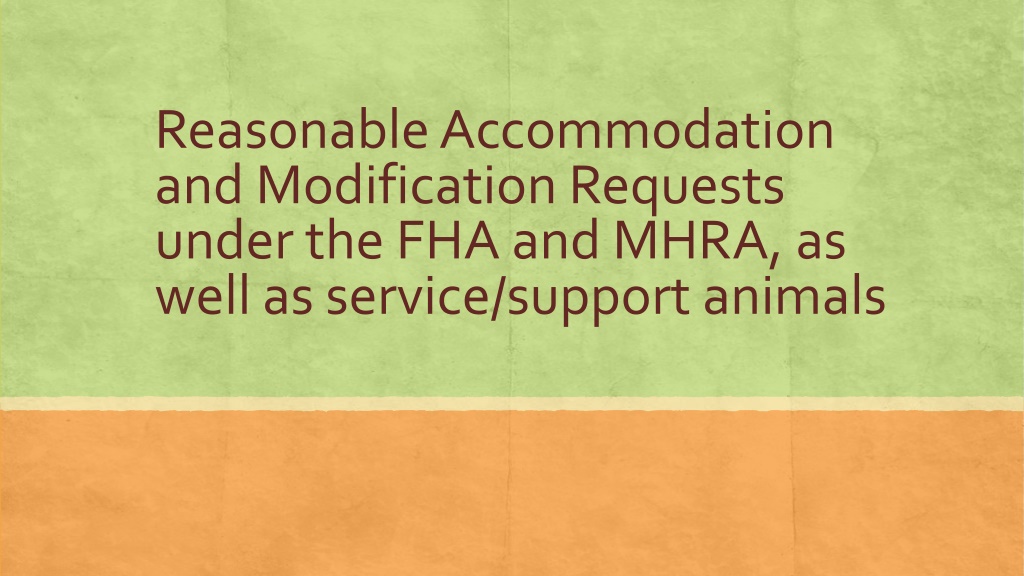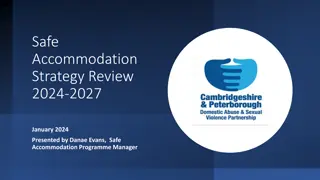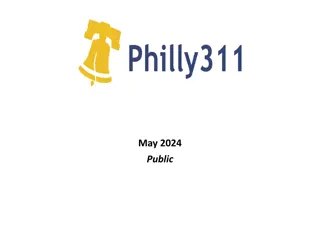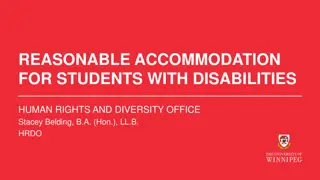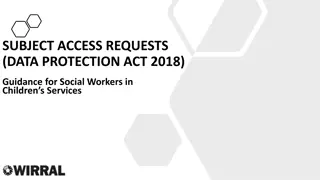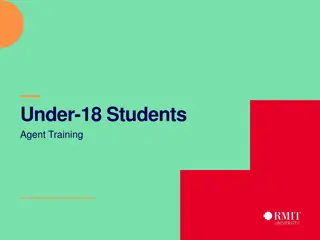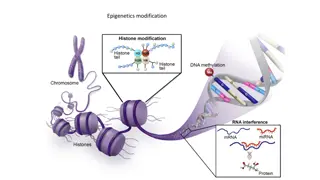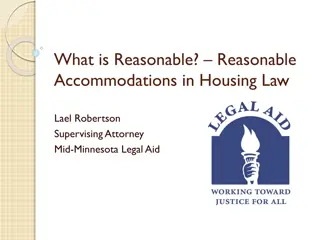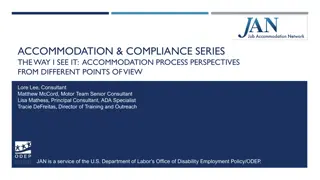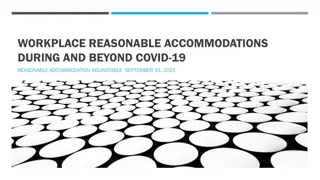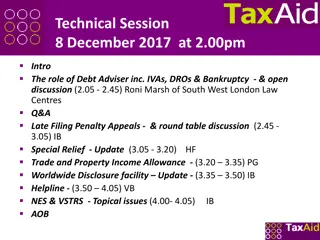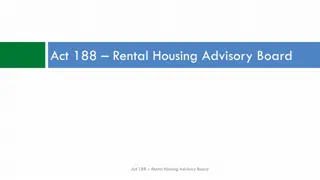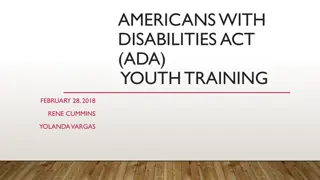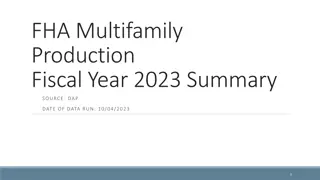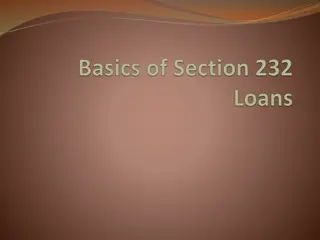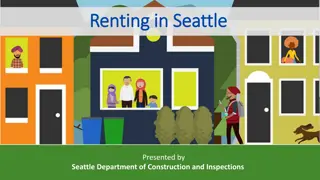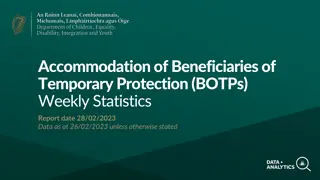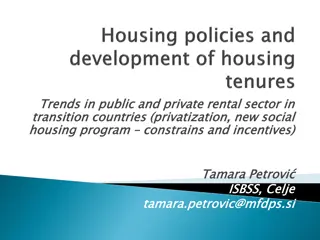Understanding Reasonable Accommodation and Modification Requests in Rental Properties under FHA and MHRA
This information delves into the coverage of rental properties by the Fair Housing Act (FHA) and the Minnesota Human Rights Act (MHRA), explaining the exemptions within these laws. It highlights the prohibition of discrimination based on race, color, religion, sex, handicap, familial status, or national origin in housing, emphasizing the requirement to permit reasonable modifications for individuals with disabilities to fully enjoy the premises.
Download Presentation

Please find below an Image/Link to download the presentation.
The content on the website is provided AS IS for your information and personal use only. It may not be sold, licensed, or shared on other websites without obtaining consent from the author. Download presentation by click this link. If you encounter any issues during the download, it is possible that the publisher has removed the file from their server.
E N D
Presentation Transcript
Reasonable Accommodation and Modification Requests under the FHA and MHRA, as well as service/support animals
Rental Properties Covered by the FHA and MHRA The FHA and MHRA cover nearly all rental properties. HUD Guidance: The Fair Housing Act covers most housing. In very limited circumstances, the Act exempts owner-occupied buildings with no more than four units, single-family houses sold or rented by the owner without the use of an agent, and housing operated by religious organizations and private clubs that limit occupancy to members. Seehttps://www.hud.gov/program_offices/fair_housing_equal_opp/fair_housi ng_act_overview#:~:text=The%20Fair%20Housing%20Act%20covers,that% 20limit%20occupancy%20to%20members and 42 U.S.C. 3603(b) The MHRA exempts even fewer types of properties. See Minn. Stat. 363A.21
The Fair Housing Act (FHA)-42 U.S.C. 3604 Generally it shall be unlawful-(d) to represent to any person because of race, color, religion, sex, handicap, familial status, or national origin that any dwelling is not available for inspection, sale, or rental when such dwelling is in fact so available. See 42 U.S. Code 3604 (d)
The Fair Housing Act (FHA)-42 U.S.C. 3604 Generally-cont d it shall be unlawful (f) (2) to discriminateagainst any person in the terms, conditions, or privileges of sale or rental of a dwelling, or in the provision of services or facilities in connection with such dwelling, because of a handicap of (A) that person; or (B) a person residing in or intending to reside in that dwelling after it is so sold, rented, or made available; or (C) any person associated with that person.
The Fair Housing Act (FHA)-42 U.S.C. 3604 Discrimination-Reasonable Modifications For purposes of this subsection, discrimination includes a refusal to permit, at the expense of the handicapped person, reasonable modifications of existing premises occupied or to be occupied by such person if such modifications may be necessary to afford such person full enjoyment of the premises except that, in the case of a rental, the landlord may where it is reasonable to do so condition permission for a modification on the renter agreeing to restore the interior of the premises to the condition that existed before the modification, reasonable wear and tear excepted. See 42 U.S.C. 3604(f)(3)(A)
The Fair Housing Act (FHA)-42 U.S.C. 3604 Discrimination-Reasonable Accommodations For purposes of this subsection, discrimination includes a refusal to make reasonable accommodations in rules, policies, practices, or services, when such accommodations may be necessary to afford such person equal opportunity to use and enjoy a dwelling See 42 U.S.C. 3604(f)(3)(B)
Definition of Handicap FHA Generally (h) Handicap means, with respect to a person (1)a physical or mental impairment which substantially limits one or more of such person s major life activities, (2)a record of having such an impairment, or (3)being regarded as having such an impairment, Note: Handicap does not include current, illegal use of or addiction to a controlled substance OR juvenile offenders and sex offenders See 42 U.S.C. 3602
Definition of Handicap -FHA Physical or Mental Impairment HUD Guidance provides that [t]he term physical or mental impairment includes, but is not limited to, diseases and conditions such as orthopedic, visual, speech and hearing impairments, cerebral palsy, autism, epilepsy, muscular dystrophy, multiple sclerosis, cancer, heart disease, diabetes, HIV infection, developmental disabilities, mental illness, drug addiction (other than addiction caused by current illegal use of a controlled substance), and alcoholism. -Joint Statement of the US Department of Housing and Urban Development and the Department of Justice, Reasonable Accommodations under the Fair Housing Act (Mary 17, 2004) at page 6
Definition of Handicap FHA Major Life Activities Major life activities include but are not limited to: Seeing, hearing, walking, breathing, performing manual tasks, caring for one s self, learning, speaking, and working. Joint Statement of the US Department of Housing and Urban Development and the Department of Justice, Reasonable Accommodations under the Fair Housing Act (Mary 17, 2004) at page 6.
Definition of Handicap FHA-42 U.S.C. 3602 HUD Guidance provides that being regarded as having a disability means that the individual is treated as if he or she has a disability even though the individual may not have an impairment or may not have an impairment that substantially limits one or more major life activities. E.g. if a landlord refuses to rent to a person because the landlord believes the prospective tenant has a disability, the landlord violates the FHA, even if the prospective tenant does not have a disability. Joint Statement of the US Department of Housing and Urban Development and the Department of Justice, Reasonable Accommodations under the Fair Housing Act (Mary 17, 2004) at pages 6-7
The Minnesota Human Rights Act Minn. Stat. 363A The MHRA provides a more extensive list of protected classes than the FHA. These include: Creed Marital status Sexual orientation Status with regard to public assistance See Minn. Stat. 363A.09
The Minnesota Human Rights Act-Minn. Stat.363A Generally It is an unfair discriminatory practice for an owner, lessee, (etc) (2) to discriminate against any person or group of persons because of race, color, creed, religion, national origin, sex, marital status, status with regard to public assistance, disability, sexual orientation, or familial status in the terms, conditions or privileges of the sale, rental or lease of any real property or in the furnishing of facilities or services in connection therewith, except that nothing in this clause shall be construed to prohibit the adoption of reasonable rules intended to protect the safety of minors in their use of the real property or any facilities or services furnished in connection therewith. See Minn. Stat. 363A.09 Subd. 1
The Minnesota Human Rights Act Minn. Stat. 363A Definitions: Disability. "Disability" means any condition or characteristic that renders a person a disabled person. A disabled person is any person who (1) has a physical, sensory, or mental impairment which materially limits one or more major life activities; (2) has a record of such an impairment; or (3) is regarded as having such an impairment. See Minn. Stat. 363A.03, Subd. 12
Examples of illegal conduct Refusal to rent Differential terms and conditions of rental Refusal to grant a reasonable accommodation of disability Retaliation 42 U.S.C. 3604; 42 U.S.C. 3617 Minn. Stat. 363A.09; Minn. Stat. 363A.15
What is a Reasonable Accommodation A change in rules, policies, practices, or services when the accommodation may be necessary to afford an individual with a disability an equal opportunity to use and enjoy a dwelling. A landlord's denial of a reasonable accommodation request is a form of disability discrimination. 42 U.S.C. 3604(f)(3)(B) Minn. Stat. 363A.10, Subd. 1(2)
Elements of a Reasonable Accommodation Request (1) The accommodation or modification must be linked to a disability-related need. In other words, there must be an identifiable relationship, or nexus, between the requested accommodation and the individual's disability. (2) Necessary to afford an equal opportunity to use and enjoy housing, and (3) Possible to implement Hubertyv. Washington County HRA, 374 F. Supp. 2d 768, 773 (D. Minn. 2005)
Unlawful for Landlords to Refuse a Reasonable Accommodation or Modification Request It is unlawful, under the FHA, for a landlord to refuse to grant a reasonable accommodation to rules, policies, practices, or services, when the accommodation or modification may be necessary for a person with a disability to have equal opportunity to use or enjoy the dwelling, including public and common use spaces (however, see slide on Landlord defenses). Joint Statement of the US Department of Housing and Urban Development and the Department of Justice, Reasonable Accommodations under the Fair Housing Act (Mary 17, 2004) at page 8.
Treating Different Tenants Differently It might seem reasonable that an RA request could be denied because granting it would force a landlord to treat different tenants in different ways. BUT REMEMBER: Accommodations are changes, exceptions, or adjustments to rules, policies, practices, or services that are necessary for persons with disabilities to have an equal opportunity to use or enjoy their residency, and, thus, treating persons with disabilities exactly the same as others may sometimes deny them an equal opportunity to use or enjoy a dwelling. See Joint Statement of the US Department of Housing and Urban Development and the Department of Justice, Reasonable Accommodations under the Fair Housing Act (Mary 17, 2004) at page 8.
Landlord Defenses Undue administrative and financial burden Fundamental alteration of the landlord's business practices Direct threat to health and safety that cannot be eliminated or significantly reduced through an accommodation Tenant does not fall under definitions of disability Joint Statement of the US Department of Housing and Urban Development and the Department of Justice, Reasonable Accommodations under the Fair Housing Act (Mary 17, 2004) at pages 15-16
Reasonable Accommodations for Animals Definitions HUD: An assistance animal is an animal that works, provides assistance, or performs tasks for the benefit of a person with a disability, or that provides emotional support that alleviates one or more identified effects of a person s disability. An assistance animal is not a pet. See https://www.hud.gov/program_offices/fair_housing_equal_opp/assistance_animals#_What_Is_a n Minnesota Service and Emotional Support Animals Service animal means any dog that is individually trained to do work or perform tasks for the benefit of an individual with a disability, including a physical, sensory, psychiatric, intellectual, or other mental disability. Other species of animals, whether wild or domestic, trained or untrained, are not service animals for the purposes of this definition. Emotional Support Animals "Support animal" means an animal that: (1) provides emotional support that alleviates one or more identified symptoms or effects of a person's disability; and (2) does not need to be trained to perform a specific disability- related task. See https://mn.gov/mdhr/yourrights/service-animals/housing.jsp
What is an emotional Support Animal? It is NOT: - A pet - A Service Animal A service animal is any dog that is individually trained to do work or perform tasks for the benefit of an individual with a disability, including a physical, sensory, psychiatric, intellectual, or other mental disability. Code of Federal Regulations, title 28, section 36.104, as amended
Emotional Support Animal "Support animal" means an animal that: (1) provides emotional support that alleviates one or more identified symptoms or effects of a person's disability; and (2) does not need to be trained to perform a specific disability-related task.
Animals Commonly kept in Households If the animal is a dog, cat, small bird, rabbit, hamster, gerbil, other rodent, fish, turtle, or other small, domesticated animal that is traditionally kept in the home for pleasure rather than for commercial purposes, then the reasonable accommodation should be granted if the requestor has provided information confirming that there is a disability-related need for the animal. -FHEO Notice: FHEO-2020-01 Issued: January 28, 2020
Unique Animals If the individual is requesting to keep a unique type of animal that is not commonly kept in households as described above, then the requestor has the substantial burden of demonstrating a disability- related therapeutic need for the specific animal or the specific type of animal. The individual is encouraged to submit documentation from a health care professional confirming the need for this animal. - FHEO Notice: FHEO-2020-01 Issued: January 28, 2020
Reasonable Accommodations for Animals No-Pet Policies No-Pet Policies do not apply to service and emotional support animals because those animals are not considered pets. See https://mn.gov/mdhr/yourrights/service-animals/housing.jsp
Reasonable Accommodations for Animals-NEW 2021 Pet Deposits Shall Not Be Required A landlord must not require a tenant with a reasonable accommodation under this section to pay an additional fee, charge, or deposit for the service or support animal. A tenant is liable to the landlord for any damage to the premises caused by the service or support animal. See Minn. Stat. 504B.113, Subd. 3 See also, https://mn.gov/mdhr/yourrights/ser vice-animals/housing.jsp
Reasonable Accommodations for Animals-NEW 2021 Documentation Required-MN Stat. 504B.113 Landlords can request documentation for each animal as part of the reasonable accommodation request process. For example, a tenant might be required to describe how the animal helps alleviate a physical and/or mental disability, or whether the animal is trained to perform a specific task. If the documentation submitted by the tenant to support their request does not appear to be reliable, a landlord may ask for additional documentation that is reliable. See Minn. Stat. 504B.113, Subd. 2 See also, https://mn.gov/mdhr/yourrights/service- animals/housing.jsp
Reasonable Accommodations for Animals Licensed Professionals under MN Stat. 504B.113 "Licensed professional" means a provider of care who is: (1) a person licensed by the Board of Medical Practice under chapter 147; (2) a physician assistant licensed under chapter 147A; (3) a nurse, as defined in section 148.171, subdivision 9, licensed under chapter 148; (4) a psychologist licensed under chapter 148; (5) a mental health professional licensed under chapter 148B; (6) a social worker licensed under chapter 148E; (7) a counselor licensed under chapter 148F; or (8) any professional listed in clauses (1) to (7) who holds a valid license in any other state, provided the professional has an existing treatment relationship with the tenant requesting a reasonable accommodation.
Licensed Professionals under MN Stat. 504B.113 -Cont d Note: The Statute specifically excludes licensed professionals who operate primarily to provide certification for a service or support animal.
Reasonable Accommodations for Animals Licenses/Immunization A landlord can insist that tenants with assistance animals comply with local ordinances requiring that animals be licensed or immunized. Similarly, all tenants must comply with laws or ordinances forbidding certain wild or exotic animals (such as wolves or lemurs) on the basis of legitimate public health and safety concerns. See https://mn.gov/mdhr/yourrights/service-animals/housing.jsp
Prohibited Conduct-Minn. Stat. 504B.113 Subd. 4. Prohibited conduct. A tenant must not, directly or indirectly through statements or conduct, knowingly: (1) misrepresent themselves as a person with a disability that requires the use of a service or support animal; or (2) provide fraudulent supporting documentation under this section. Subd. 5. Penalty. If a tenant violates this section, the landlord may deny the tenant's rental application or request for a service or support animal. Nothing in this section shall be construed to prohibit an eviction action based on a breach of the lease. See Minn. Stat. 504B.113
Evictions/Housing Termination Contact an Attorney Request a Reasonable Accommodation Time to request RA extends to time that tenant is actually evicted. See Radecki v. Joura, 114 F.3d 115, 116 (8th Cir. 1997)
Filing a fair housing complaint 1 year deadline to file an administrative complaint with HUD or the Minnesota Department of Human Rights No duty to exhaust administrative remedies under the fair housing provisions of the FHA or MHRA 1 year to file in court under the MHRA 2 years to file in court under the FHA 42 U.S.C. 3610; 42 U.S.C. 3613 Minn. Stat. 363A.28
